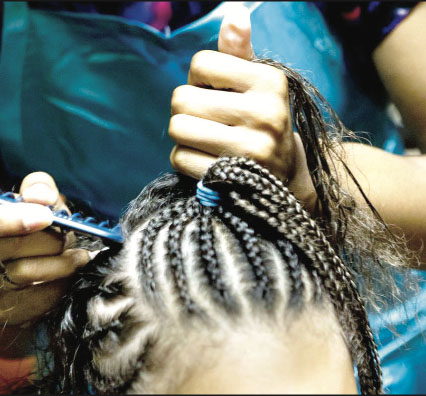By Monica Edwards | Federal Policy manager at URGE: Unite for Reproductive & Gender Equity
“Despite the great strides in American society and the laws made to reverse the racist ideology that Black traits are inferior, hair remains a rampant source of racial discrimination with serious economic and health consequences, especially for Black individuals.”
This text can be found in S.B. 50, an Alabama Senate bill that would prohibit discrimination based on hair in public accommodations, employment, and seeking state and/or federal assistance. If discriminated against based on one’s hair by an employer, this law would create a cause of action for said discrimination.
This legislation goes further than protections currently under federal law by not only including hairstyles, such as braids or locs, under protected styles, but it also encapsulates the way in which not just hair, but Black hair specifically, has been weaponized to maintain white supremacy as the status quo.
As an Alabama native, I know too well the negative attention my home state often receives due to a history of unfortunate, downright discriminatory, and unjust legislation. In addition to S.B. 50, that legacy of unjust legislation continues with the clearly discriminatory redistricting map that many legislators are wielding as a tool to redress centuries of harm.
Advocates on the ground in Alabama are working with legislators to not just react to consistent waves of oppressive policies but to put forth proactive solutions that can actualize bodily autonomy. We must recognize the parallels between this overall movement to ensure bodily autonomy and the movement to stop discrimination against Black hair. For Black women, bodily autonomy is a right that we have consistently been denied and continue to fight for. Pushing for an end to hair discrimination is one way we can inch toward a world where our right to bodily autonomy is actualized and respected.
The waves of the natural hair movement didn’t happen by chance. It happened after Black folks spent centuries being forced to assimilate to European beauty standards to our own detriment. Many of us remember the sizzling sound of the hot comb making its way through our freshly greased hair to straighten it or the intense tingling felt when a chemical relaxer was left on our scalps for a tad bit too long.
These memories can be both heartwarming and heartbreaking as we reckon with the reality that for many, manipulating our Black hair was not just about beauty standards or personal desires but, oftentimes, survival.
Blackness is seen by many as threatening and as inferior, and that doesn’t stop at our hair. How we are perceived from our white and other non-Black peers can be the determining factor on whether we can access housing, competent health care, jobs, and even whether we are subjected to violence or death. A closer proximity to whiteness achieved by adhering to European beauty standards is how many of our ancestors attempted to skirt brutality and racial disparities in society.
Anti-Blackness is real, and it comes in many forms, including hair discrimination. Bodily autonomy for Black women and all Black folks includes the ability to present ourselves in a way that is affirming to us. Whether that is with a 4C afro, locs, braids, a synthetic wig, or beautiful baldness, we deserve to live and thrive in safe and sustainable communities free from violence and discrimination.
We cannot undo a past riddled with anti-Black racism in Alabama or this country, but we can put in place actionable solutions and restorative policies to redress harm within a broken system. Passing S.B. 50 in Alabama would be a way to work toward what I consider “hair justice”.
Integral to Black liberation is bodily autonomy. We will never achieve bodily autonomy if discrimination against the very thing that sits atop our bodies – our hair, Black hair – continues. We need hair justice. We need S.B. 50.










